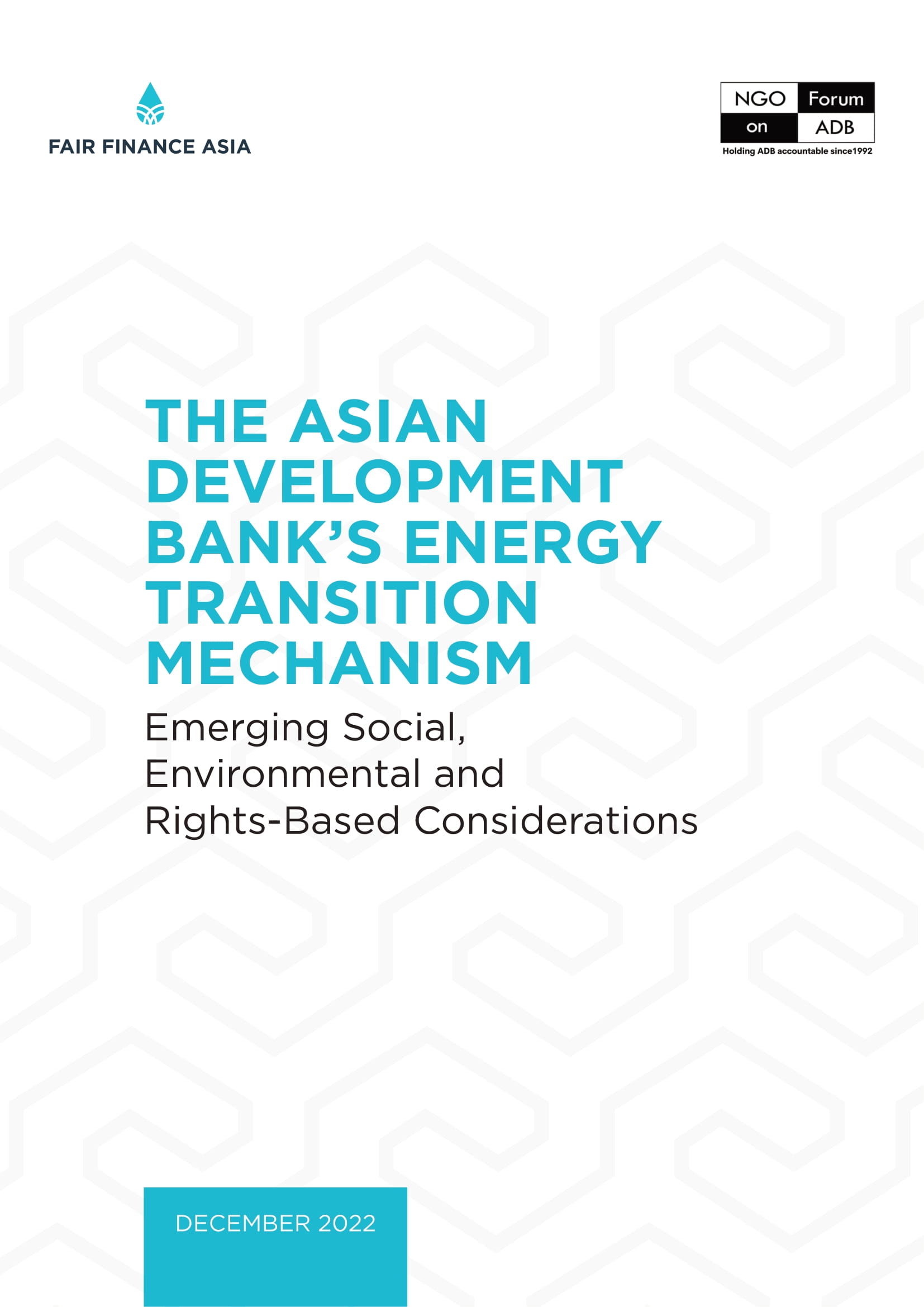
On January 26, 2023, Fair Finance Asia (FFA) and NGO Forum on ADB (the Forum) launched a new report, “The Asian Development Bank’s Energy Transition Mechanism: Emerging Social, Environmental and Rights-Based Considerations.” The report raises critical questions and concerns about the Energy Transition Mechanism (ETM), which is being advanced by the Asian Development Bank (ADB) as a market-oriented solution to accelerate the process of taking coal power off of national energy grids in specific Southeast, South and Central Asian countries and replacing it with other sources of power.
FFA and the Forum developed this report to serve as a source of key information for groups monitoring how the ETM is being operationalized, as well as for communities living around, and working at, coal project sites selected for ETM implementation. As ADB advances plans to pilot the ETM in Indonesia, Philippines, Pakistan, and later Kazakhstan and Vietnam, the report reiterates key risks and concerns being raised by civil society, community, and workers’ organizations about the design and proposed implementation of the ETM.
In particular, FFA and the Forum’s new report highlights that, to date, the ETM:
- Does not require participating governments or companies to suspend the development of planned or under construction coal power projects and commit to phasing out coal power by 2040, as per the Paris Climate Agreement. The sheer number of coal power projects still expected to be added to national grids in the future (those that are now in the planning, pre-permitting, permitting, and construction phases) may overshadow the number slated for retirement. For example, while the ETM will be piloted in Indonesia at the 660MW Cirebon 1 site, an expansion unit of 1000MW (Cirebon 2) that is being developed by the same parent company, Cirebon Power, is set to begin commercial operations in the near future.
- Lacks clarity on the extent to which ADB’s social and environmental safeguards will apply at pilot coal power project sites over the course of retirement (estimated by the ADB to take between 10-15 years), and whether surrounding communities will have access to filing grievances under the ADB’s accountability mechanism. The ADB’s ETM also lacks provisions to require pilot coal power project operators to adhere to internationally accepted human rights standards, such as binding United Nations treaties or the UN Guiding Principles on Business and Human Rights (UNGPs).
- Lacks channels for community groups, labor rights groups/local union bargaining units or other concerned civil society groups to meaningfully shape the terms of coal power project retirement (and hence their future), as negotiations for site specific retirements take place behind closed doors. In Indonesia, for example, plans to pilot the ETM are moving forward at the Cirebon 1 Coal Power Project, but are being discussed without the involvement of community groups and workers, who have not been fully informed or given the opportunity to provide their perspectives.
- Lacks clarity on the definition of clean energy options to be developed and parameters for repurposing projects. Loosely defining support for low carbon/clean energy options risks incentivizing the development of unsustainable resource-intensive options that have no place in a just energy transition, including waste-to-energy incinerators, facilities to burn woody biomass, projects that replace coal or are co-fired with hydrogen sourced from fossil gas, large hydropower dams, or carbon capture and storage infrastructure.
- Lacks transparency in relation to the actual terms and conditions for coal power project retirement. The ETM model does not rely on any payment caps to coal power project operators to accelerate retirement, nor does it require the terms of retirement to be disclosed. Compensation to coal operating companies therefore risks being paid at a highly inflated rate.
The report also provides a set of initial recommendations in cases where the ADB and ETM implementing partners, such as the World Bank Group (WBG), have been involved in supporting the coal sector and industries.
To read the full report click here.
To read Fair Finance Guide Japan’s briefing paper of the ADB’s ETM (available in Japanese and English) click here.